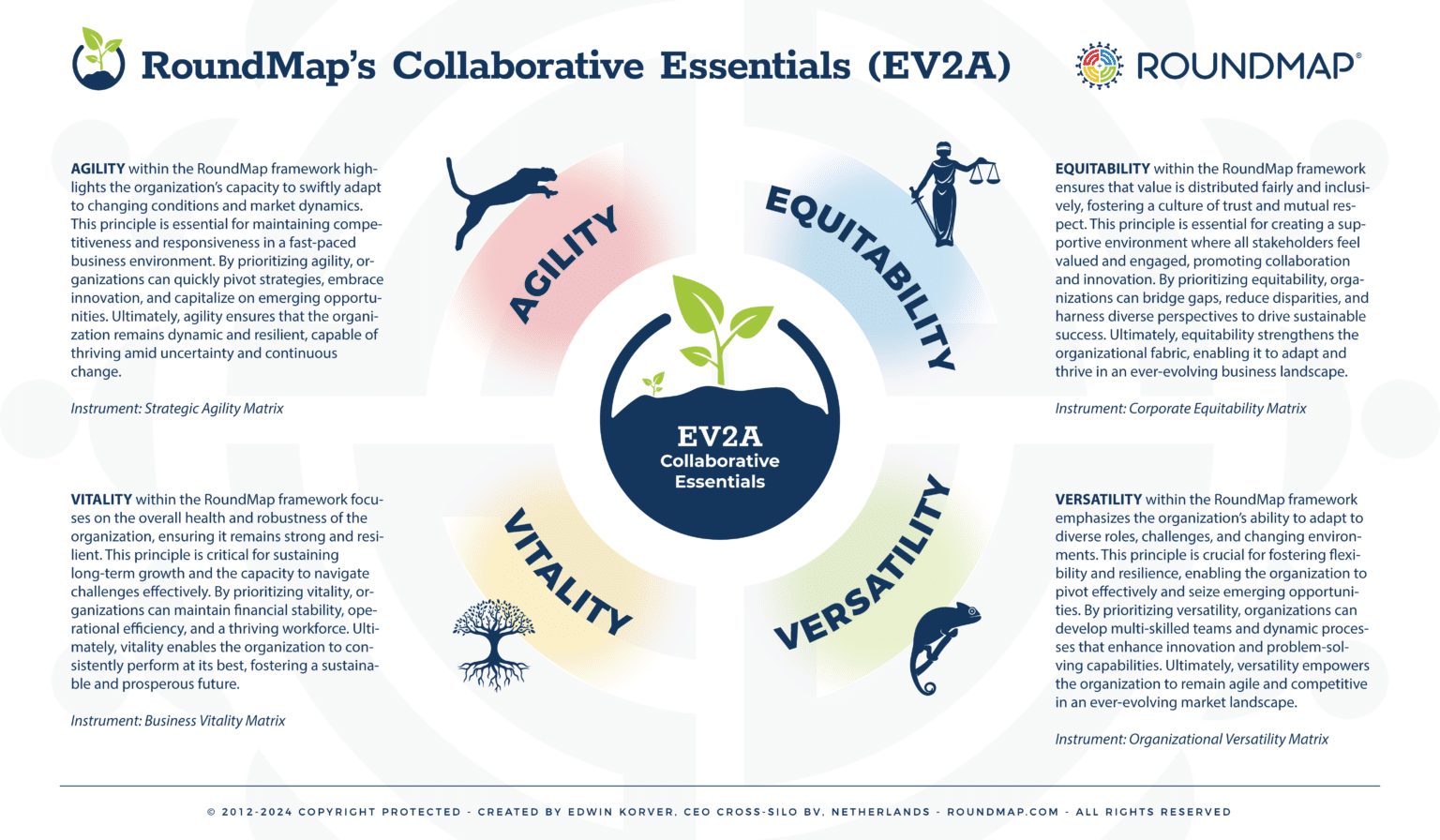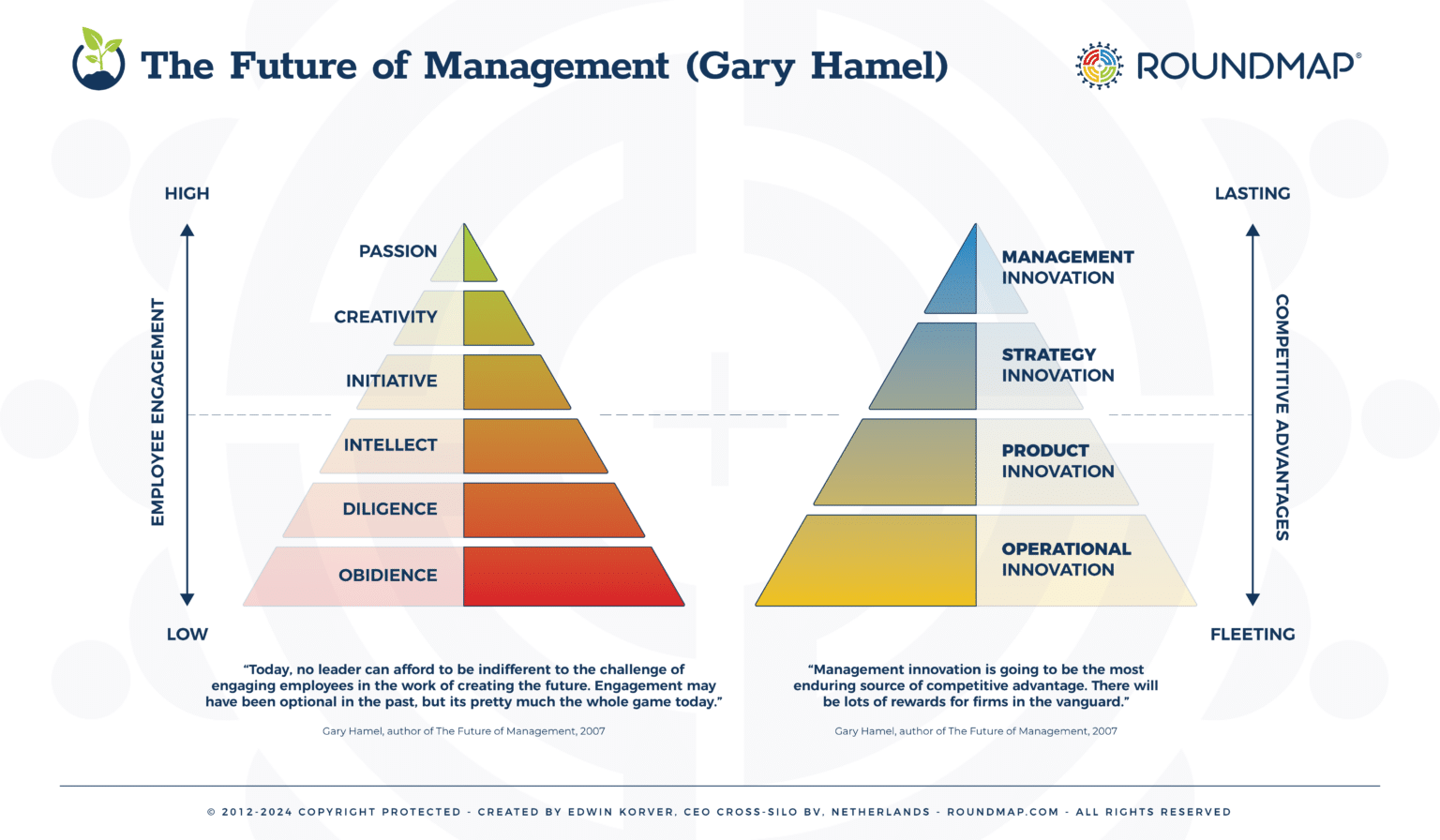Equitable and Sustainable Business Growth
At the heart of our mission lies a commitment to fostering a culture of resilience, collaboration, and agility within organizations. We envision a future where businesses thrive on a strength-driven foundation, engaging every team member in a self-organizing and adaptive structure that embraces change and champions innovation and swift transformation.
The genesis of this vision dates back to 2016 when Edwin Korver, the founder of CROSS-SILO and the creator of RoundMap®, embarked on a quest to unravel the impact of social and digital media on customer development. This inquiry led to a comprehensive 360-degree customer lifecycle, laying the groundwork for a transformative journey into business models, strategy, culture, and transformation.
Edwin’s exploration was characterized by a holistic approach, starting from the ground up at the Ultimate Level of Truth™ —the frontline operations. This journey of discovery led to the creation of the Business Model Matrix™ and paved the way for a full-fledged framework that redefines business innovation and growth.
Through his research, Edwin identified a critical imbalance in the modern business landscape: the overwhelming preference for specialization had inadvertently fostered functional silos, stifling the very agility and flexibility businesses require to navigate the rapid pace of change. He recognized the paramount importance of bridging this gap through whole-system thinking and change, principles that now form the cornerstone of our advanced training program, the Grandmasters of Business™.
Our journey has been enriched by the unwavering support and insights from a circle of trusted allies, including Edwin’s wife, Stella, and esteemed colleagues Henk Koopmans, Vincent van Beek, Patrick Petersen, and Gerard van Vliet. Together, they have contributed to the birth of RoundMap®, a unified business framework that guides companies in discovering, designing, developing, and directing transformative business ventures.
This narrative is more than a story of innovation; it’s a testament to the power of collective vision and the relentless pursuit of understanding the intricate dance between digital transformation and customer engagement. As we look forward, RoundMap® stands as a beacon for companies eager to navigate the complexities of modern business, armed with the tools and insights to achieve sustainable growth and unprecedented innovation.
Focus on Management Innovation
Management Innovation refers to the introduction of significant changes in how organizations manage and organize themselves, including their corporate structure, processes, and practices, to enhance overall performance and adaptability and create sustainable competitive advantage. Unlike technological or product innovations, management innovations focus on reinventing and improving managerial aspects, such as decision-making processes, strategies, leadership styles, and organizational culture.
At its core, Management Innovation is about challenging and transforming conventional management wisdom and practices to better align with the evolving business landscape, technological advancements, and changing workforce expectations. It involves experimenting with novel ideas, methodologies, and tools to foster a more dynamic, responsive, and engaging work environment.
This form of innovation is pivotal for organizations aiming to navigate the complexities of the modern market, encouraging a shift towards more collaborative, transparent, and flexible management structures. By adopting a holistic approach to management, companies can unlock new growth opportunities, enhance employee engagement, and drive meaningful change, ensuring long-term resilience and success.
The Imperative of Management Innovation
- Rapid Technological Advancements: The pace of technological change is unprecedented, influencing how products are made, services are delivered, and organizations are structured and managed. To remain competitive and harness new technologies effectively, companies need innovative management strategies that can adapt quickly.
- Globalization and Increased Complexity: With businesses operating on a global scale, managing across different cultures, regulations, and markets adds layers of complexity. Management innovation helps navigate these complexities by fostering worldwide collaboration and leveraging diversity for competitive advantage.
- Evolving Workforce Expectations: The modern workforce demands more than a paycheck; they seek purpose, flexibility, and personal growth opportunities. Innovative management practices can help create engaging and empowering work environments that attract and retain top talent.
- Sustainability and Social Responsibility: Businesses are increasingly expected to operate sustainably and ethically. Management innovation encourages companies to integrate sustainability into their core strategy, ensuring long-term viability and positive social impact.
- Increased Market Volatility: Markets today are more volatile than ever, driven by fast-changing consumer preferences, economic shifts, and geopolitical events. Adaptive and resilient management practices enable organizations to pivot quickly in response to market changes, seizing opportunities while mitigating risks.
- Breakthroughs in Management Theories and Practices: New theories and practices in leadership, organizational behavior, and strategic management provide fresh perspectives and tools for driving business success. By innovating management, companies can apply these insights to outperform competitors.
- Demand for Greater Transparency and Trust: Stakeholders, including customers, employees, and investors, demand greater transparency and ethical conduct from businesses. Innovations in management can foster a culture of trust, transparency, and integrity, aligning stakeholder interests with organizational goals.
- Need for Integration and Systems Thinking: The interconnectedness of today’s business environment requires a holistic view that considers the entire ecosystem of stakeholders, processes, and impacts. Management innovation promotes systems thinking and integrated approaches to decision-making.
In summary, management innovation is a response to the changing business landscape and a strategic imperative for organizations seeking to thrive amid uncertainty. It offers a pathway to creating more adaptive, resilient, and purpose-driven businesses capable of meeting the demands of the 21st century.
Summary
CROSS-SILO and RoundMap® are at the forefront of building future-fit organizations, steering companies through transformative growth by harmonizing business models, strategies, culture, and management innovation. This visionary approach ensures companies adapt and thrive in our dynamic world, fostering resilience and sustainable success.











